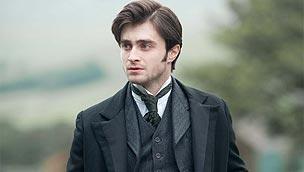BBFC reveals how Black Swan sex scenes ruffled feathers
- Published

Black Swan was nominated for five Oscars in 2011 and won one for best actress
The age rating for Black Swan generated the most complaints to the British Board of Film Classification (BBFC) in 2011, the ratings body has revealed.
The erotically charged thriller, rated 15 in the UK, generated 40 complaints from audiences.
According to the BBFC's annual report, "some complainants had expected to see a film about ballet".
Instead, it continued, the Natalie Portman film depicted "the story of a young woman's mental disintegration".
The BBFC announced it had commissioned a major research project - the first for 10 years - into public attitudes over sexual violence in films.
The report is due to be published later this year.
Presenting the annual report in London on Wednesday, BBFC director David Cooke said the 40 complaints for Black Swan constituted a "very small number".
By contrast, 2012 release The Woman in Black has received around 120 objections to its 12A rating.
Portman won the best actress Oscar in 2011 for her portrayal of a ballerina who loses her grip on reality while dancing Swan Lake.
What ruffled the feathers of most complainants, according to the BBFC, was a sex scene between two female characters.
"While the scene is visually discreet, narratively justified and within the 15 guidelines criteria, some correspondents felt it was pornographic in nature," the report reads.
"That it was a sex scene between two women was an aggravating factor for some who argued that portrayals of homosexual activity should either be restricted to the 18 category, or not shown at all.
"The high number of complaints for Black Swan demonstrates the disconnect that sometimes occurs between a viewer's expectations of a film and its actual content."
The BBFC said a trio of films classified at 12A featuring young heroines had also dominated its postbag in 2011.
'Sadistic and gratuitous'
Hanna, featuring Saoirse Ronan as a teenage assassin, generated 29 complaints, with some viewers finding the film's violence "sadistic and gratuitous".
Next with 16 complaints was The Twilight Saga: Breaking Dawn - Part 1, in which heroine Bella and her vampire boyfriend Edward marry and consummate their relationship.

The Woman in Black is the most complained-about film of 2012 so far
A "few" complaints concerned the wedding sex scene, which had already been reduced in strength to secure a 12A rating, the BBFC said.
"The majority of complaints focused on the sequence in which an emergency Caesarean section is performed on Bella, which some viewers found gory and distressing," the report states.
The film Sucker Punch received 15 complaints for its perceived sexual suggestiveness and the level of threat aimed at the female characters.
The BBFC's decision to refuse to issue a certificate to The Human Centipede II (Full Sequence) in 2011 provoked "a fierce debate", it said. The film was later rated 18 after cuts.
Another film, The Bunny Game - in which a truck driver abducts and sexually abuses and tortures a prostitute - was refused a certificate.
"The BBFC intervened with both of these works on account of their depictions of extreme violence against women," the BBFC said.
Partly as a result of these and other films, the BBFC said it had commissioned "a major new piece of original research into depictions of sadistic, sexual and sexualised violence" to determine public attitudes.
The last piece of research in this area was carried out in 2002.
Among the films being viewed by focus groups are Lars von Trier's Antichrist, Michael Winterbottom's The Killer Inside Me, French-Canadian horror film Martyrs and uncut versions of A Serbian Film and The Human Centipede II.
"I have no doubt we are one of the more conservative classification bodies in Europe," said Mr Cooke.
"These things always vary when you get into the fine detail, but you only have to look across the Channel to France to see a classification regime which is way less conservative."
The US censor, by comparison, was "more squeamish about sex than we are than but prepared to tolerate stronger violence", he went on.
Mr Cooke also said that the BBFC was supporting proposals for an adjustment to the Video Recordings Act which would no longer exempt from classification some music videos and documentaries containing material "potentially harmful to children".
The BBFC is celebrating its centenary in 2012, with a book charting 100 years of classification scheduled for the autumn.
- Published5 July 2012
- Published22 May 2012
- Published13 March 2012
- Published13 June 2011